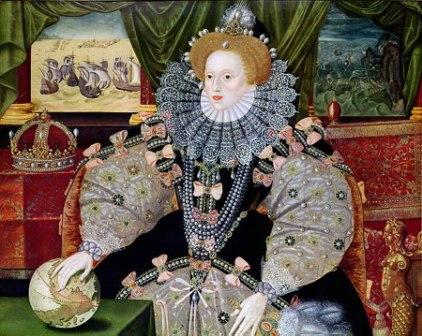 |
| Queen Elizabeth presiding over Parliament, circa 1580-1600. Picture acquired through Wikimedia Commons. Image public domain. |
On this day in Elizabethan history in 1601, Queen Elizabeth I delivered what has become known as The Golden Speech at Whitehall Palace to members of her last Parliament.
The speech was recorded and reproduced for circulation around the kingdom. Queen Elizabeth may have intuitively known that her life and reign were drawing to a close, (she died just two years later) and therefore felt compelled to express her gratitude to those who had so faithfully served her.
The Golden Speech is considered one of Elizabeth's masterpieces, and it is arguably her most heartfelt expression of her dedication to her role as Queen of England, and of her profound devotion to her people. In one of my original BeingBess historical presentations, I deliver The Golden Speech as Queen Elizabeth I, and I will have you know that I always get teary eyed when relaying her words.
Read The Golden Speech for yourself, below. I have updated most of the original spelling and grammar for clarity, but I have retained it where it is important.
The Golden Speech
We perceive your coming is to present thanks unto us; Know I
accept them with no less joy than your loves can have desire to offer such a
present, and do more esteem it then any treasure of riches, for those we know
how to prize, but Loyalty, Love and Thanks, I account them invaluable, and
though God hath raised Me high, yet this I account the glory of my crown, that
I have reigned with your Loves. This makes that I do not so much rejoice that
God hath made Me to be a Queen, as to be a Queen over so thankful a people,
and to be the mean under God to conserve you in safety, and preserve you from
danger, yea to be the instrument to deliver you from dishonor, from shame, and
from infamy; to keep you from out of servitude, and from slavery under our
Enemies; and cruel tyranny, and wild oppression intended against us: for the
better withstanding whereof, We thank very acceptably your intended helps, and chiefly in that it manifesteth you loves and largeness of heart to your
Sovereign.
Of myself I must say this, I never was any greedy scraping
grasper, nor a strict fast holding Prince, nor yet a waster. My heart was never
set upon any worldly goods, but only for my subjects good. What you do bestow
on Me, I will not hoard up, but receive it to bestow on you again.
Yea, Mine own properties I account yours to be expended for
your good, and your eyes shall see the bestowing of it for your welfare.
I esteem my peoples love, more than
which I desire not to merit: And God that gave me here to sit, and placed me
over you, knows that I never respected myself, but as your good was conserved
in me; yet what dangers, what practices, and what perils I have passed, some,
if not all of you know: but none of these things do move me, or ever made me
fear, but it is God that hath delivered me.
And in my governing this Land, I
have ever set the last Judgement day before mine eyes, and so to rule, as I
shall be Judged and answer before a higher Judge, to whose Judgement Seat I do
appeal in that never thought was cherished in my heart that tended not to my
peoples good.
And if my Princely bounty have been
abused, and my grants turned to the hurt of my people contrary to my will and
meaning, or if any in authority under me have neglected, or converted what I
have committed unto them, I hope God they will not lay their culps to my
charge.
To be a King, and wear a crown, is a
thing more glorious to them that see it, than it is pleasant to them that bear
it: for myself, I never was so much enticed with the glorious name of a King, or
to the royal authority of a Queen, as delighted that God hath made me His
Instrument to maintain His Truth and Glory, and to defend this Kingdom from
dishonor, damage, tyranny, and oppression. But should I ascribe any of these
things unto myself, I were not worthy to live, and of all most unworthy of the
mercies have received at God’s hands but
to God only and wholly all is given and ascribed.
 |
| A detail of the crown in The Armada Portrait. Attributed to George Gower, 1588. Picture Lara E. Eakins. Image public domain. |
The cares and trouble of a crown I
cannot more fitly resemble then to the drugs of a learned physician, perfumed
with some aromatic savor, or to bitter pills gilded over, by which they are
more acceptable or less offensive; and for my own part, were it nor for
conscience sake to discharge the duty that God hath laid upon me, and to
maintain his glory, and keep you in safety; in mine own disposition I should be
willing to resign the place I hold to any other, and glad to be freed of the
Glory with the Labors, for it is not my desire to live nor to reign longer than
my life and reign shall be for your good. And though you have had and may have
many mightier and wiser Princes sitting in this seat, you never had nor shall
have any that will love you better.


.jpg)

